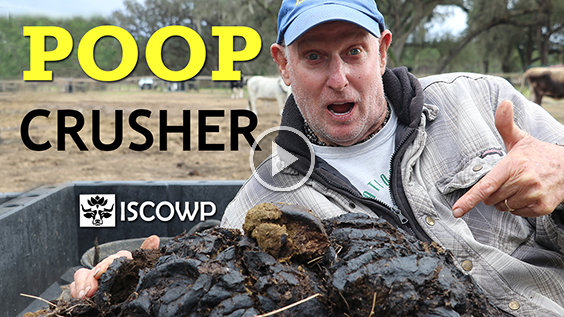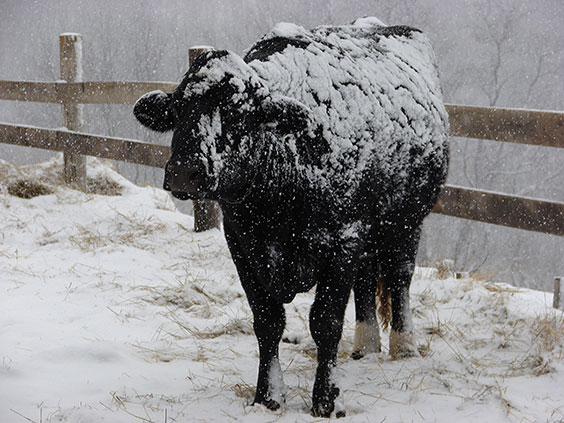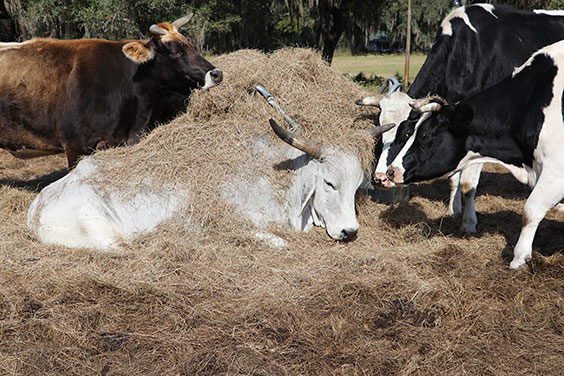- ISCOWP E-newsletters
Special Note for Your Annual Receipt/Tax Letter Over the past three years, we have implemented online donation software to accept ...

Use a Poop Crusher (chain drag) to clean, fertilize and lessen fly propagation in your fields the nonchemical way. Using the Poop Crusher is easy and we will show you how. During this cold winter, the ISCOWP herd stays close to the food supply, the hay rings. Therefore we are getting a lot of cow poop daily in a concentrated area. Cow manure can be beneficial to your farm, but too much can be a problem, especially in one place. If you have a sanctuary and are protecting cows, you will always have cow poop. No matter how old a cow is, she will always supply poop. Our How to Use Cow Manure, Part 1 showed how we use cow poop in our garden to grow vegetables and fruits. In How to Use Cow Manure Part 2, we showed how to spread cow manure on the fields to fertilize them after it has been gathered up. In this video, The Poop Crusher, How to Use Cow Manure Part 3, we show how to use cow manure without moving it from the fields. This method is useful when you have cows spread out over a large area and mingling around the food source (hay) in wintertime.
ISCOWP News


By popular demand, we are continuing to post photos from the past, but now we will try to include ISCOWP cows who have passed away. In addition to the 24 cows we have now, ISCOWP has protected 37 cows until their natural passing. We have also been fortunate to place 15 cows in loving homes. The photo above is of Asha when we had our sanctuary in West Virginia. She and her friend Kamadhenu were owned by Hoy and Lillie Robinson, breeders of Black Angus cows. Both calves had physical defects that disqualified them for breeding. Their owner called us several times to take them because he could not in good conscience sell them directly to the slaughterhouse. After he could find no one else to ake them we took them and Asha lived with us until she passed away in 2016 in Florida. She had a defect in her hips that made her wobbly on her feet. We called her Hula Girl. With great determination, she walked over all the hilly pastures of our farm in West Virginia. The vets told us there was nothing that could be done and eventually she would not be able to walk. To the surprise of the vets, she walked until a few weeks before she passed away thirteen years later.
Our personal experience is that it is easier to care for cows and the cows are healthier and live longer in a warm climate. Also flat land as opposed to hilly land helps to make cow protection easier and life less stressful for the cows. We thought perhaps the heat during Florida’s summer would stress the cows, but during the summer the cows take shelter under the Live Oak Trees where it can be 15 degrees lower. Although there is often no grass to eat during the Florida winter, there are no snow, ice, and freezing temperatures to make our lives and the cows’ lives more difficult. We know what it is like to trek through snow above our knees in below-freezing weather to care for the cows. Our prayers go out to all facing the snowstorms predicted for the country this week.
About Cows


One of the reasons that ruminant animals like cattle, sheep, and goats are well-suited to cold climates is due to their rumen. The digestive process that takes place in the four-chambered stomach generates quite a bit of heat. As the rumen breaks down the cellulose material in forage, the tiny microbes anaerobically digest it releasing gas that keeps the animal warm. Many livestock farmers in cold weather climates intentionally feed hay in the afternoon or early evening to help time the rumination process for the evening and early morning hours when temps are at their lowest. Can Livestock Handle Cold Weather
About the Meat and Dairy Industries
US Senator Cory Booker (D-NJ) has been appointed to the Senate Committee on Agriculture, Nutrition, and Forestry, one of the oldest Senate committees whose jurisdiction focuses on agriculture, nutrition, food, and hunger. He is a vegan.
“In December 2019, Booker also introduced the Farm System Reform Act which would, among other things, place a moratorium on large industrial animal operations, sometimes referred to as concentrated animal feeding operations (CAFOs).
Large CAFOs produce enormous amounts of animal waste and other harmful pollution, which are directly linked to environmental and health problems for farming communities across the country. These factory farms create runoff pollution that can contaminate waterways and drinking water. According to the Center for Disease Control and Prevention, large CAFOs produce as much as 1.4 billion tons of waste each year and are not required to maintain a treatment facility for livestock waste. The number of CAFOs have dramatically increased over the years and the steady growth makes rural communities vulnerable to environmental hazards and threaten the economic prosperity of family farms. The overuse of medically important antibiotics by large CAFOs has led to the generation and spread of dangerous antibiotic resistant bacteria. Last month, the American Public Health Association urged federal, state, and local governments and public health agencies to impose a moratorium on all new and expanding CAFOs.” Cory Booker